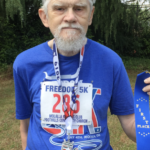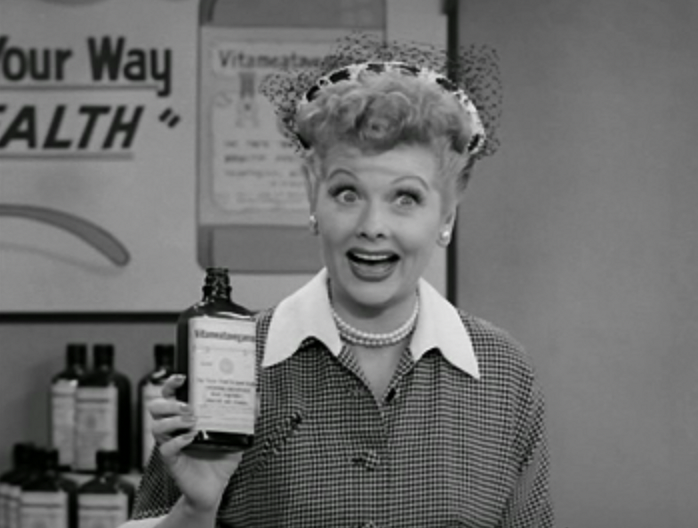 Back in the early days of television, in the 1950s, popular television shows, such as ‘I Love Lucy’ were sponsored by products such as Sanka coffee and Lilt hair styling products. Lucy spoofed the sponsors with her famous Vitameatavegemin skit. That fictional product was uncannily similar to an actual product that was heavily advertised on many popular shows, named Geritol, which was an alcohol-based iron and B vitamin tonic. It sponsored TV shows that appealed to older viewers, such as The Lawrence Welk Show, What’s My Line?, and The Red Skelton Show.
Back in the early days of television, in the 1950s, popular television shows, such as ‘I Love Lucy’ were sponsored by products such as Sanka coffee and Lilt hair styling products. Lucy spoofed the sponsors with her famous Vitameatavegemin skit. That fictional product was uncannily similar to an actual product that was heavily advertised on many popular shows, named Geritol, which was an alcohol-based iron and B vitamin tonic. It sponsored TV shows that appealed to older viewers, such as The Lawrence Welk Show, What’s My Line?, and The Red Skelton Show.
Geritol was billed as a remedy for “tired blood” and was targeted mainly at senior citizens who did not feel as energetic as they had in their youth. The idea that consuming an iron supplement to counteract the effects of aging, could not have been more wrong. Iron is indeed an essential nutrient, but excess iron actually accelerates the aging process, rather than counteracting it.
 A recent theory article published October 12, 2021 in the scholarly journal Aging, titled Iron: an underrated factor in aging, presents a well-documented argument that excess iron in the blood is a driver of the aging process. Iron is, of course, an essential nutrient, without which, life as we know it would be impossible. However, too much of a good thing can be harmful, and that is certainly the case when it comes to iron. Within the body, iron reacts with hydrogen peroxide to create the highly reactive free radical, the hydroxyl. Most iron in cells is bound to proteins which prevent it from reacting with other molecules. However, excess iron can overcome the ability of proteins to keep the iron out of circulation, enabling it to create free radicals. Those free radicals cause damage that we recognize as the result of aging.
A recent theory article published October 12, 2021 in the scholarly journal Aging, titled Iron: an underrated factor in aging, presents a well-documented argument that excess iron in the blood is a driver of the aging process. Iron is, of course, an essential nutrient, without which, life as we know it would be impossible. However, too much of a good thing can be harmful, and that is certainly the case when it comes to iron. Within the body, iron reacts with hydrogen peroxide to create the highly reactive free radical, the hydroxyl. Most iron in cells is bound to proteins which prevent it from reacting with other molecules. However, excess iron can overcome the ability of proteins to keep the iron out of circulation, enabling it to create free radicals. Those free radicals cause damage that we recognize as the result of aging.
Rapamycin is a drug that has been shown to retard the aging process in model organisms. In the body, mTOR, the mechanistic Target Of Rapamycin, accelerates aging. Rapamycin retards aging by inhibiting mTOR activation. From this we can conclude that blocking the effect of iron extends lifespan.
- In one model organism, limitation of iron increases lifespan by inducing autophagy
- Dietary tea extracts increase lifespan in a different organism by blocking absorption of iron
- Curcumin increases lifespan in at least three different model organisms by chelating iron in the blood
- EGCG, a compound found in green tea, extends the lifespans of two different model organisms. EGCG is a strong chelator of iron
- Regular aspirin users have lower body iron stores, extended lifespan, and fewer cancers
- Ibuprofen extends lifespan in at least three model organisms
- Metformin extends lifespan in mice
- Quercetin, a powerful chelating agent that sequesters iron, extends lifespan in a model organism
- Calorie restriction is the most robust life-extending intervention known. In the process of restricting calories, people avoid high calorie foods, many of which contain large quantities of iron
As can be seen, iron plays a role in many of the life extension interventions that have been shown by experiment to extend lifespan. Contrary to the health-promoting image projected by Geritol commercials, it seems clear that excess iron in the blood is not a good thing for anybody. People who have an actual deficiency of iron (iron deficiency anemia) may benefit from taking an iron supplement, but for most people, who may be concerned that they might have “tired blood,” taking an iron supplement is probably a bad idea.
BIO:
Allen G. Taylor is a 40-year veteran of the computer industry and the author of over 40 books, including Develop Microsoft HoloLens Apps Now, Get Fit with Apple Watch, Cruise for Free, SQL For Dummies, 9th Edition, Crystal Reports 2008 For Dummies, Database Development For Dummies, Access Power Programming with VBA, and SQL All-In-One For Dummies, Third Edition. He lectures internationally on astronomy, databases, innovation, and entrepreneurship. He also teaches database development and Crystal Reports through a leading online education provider. For the latest news on Allen’s activities, check out his blog at wwwallengtaylor.com or contact him at allen.taylor@ieee.org